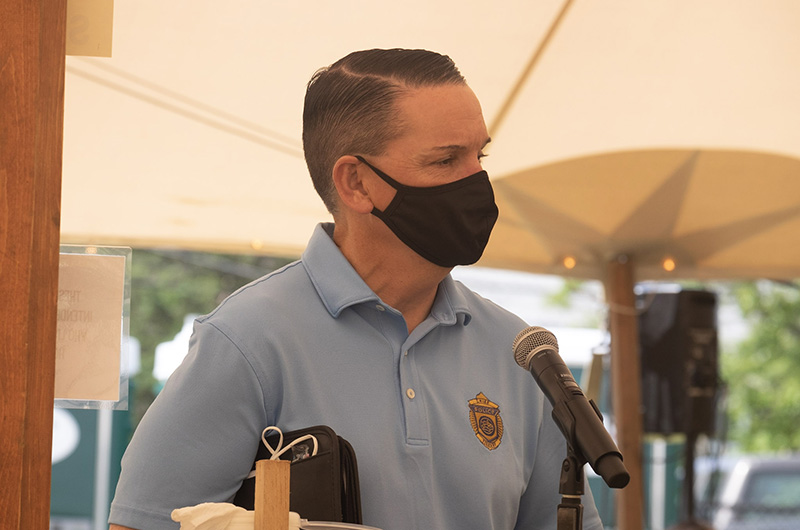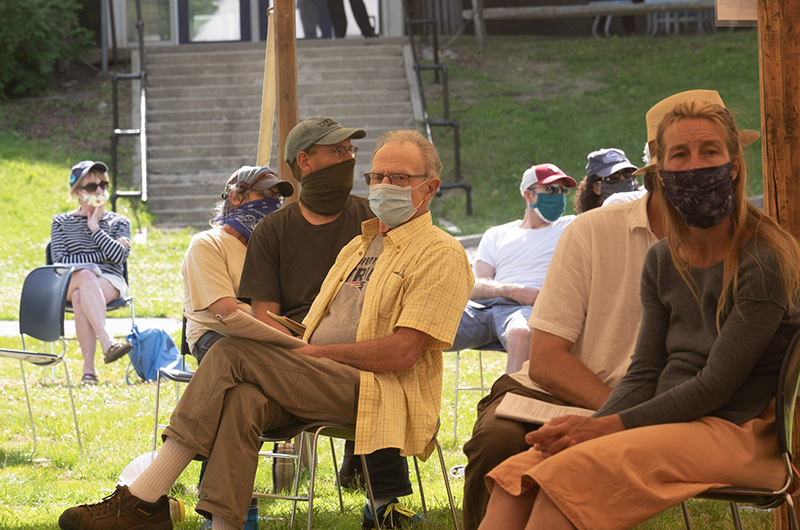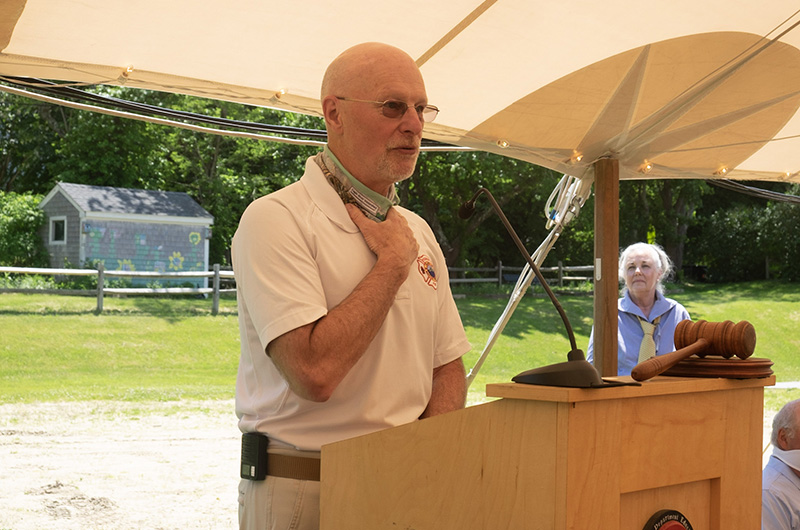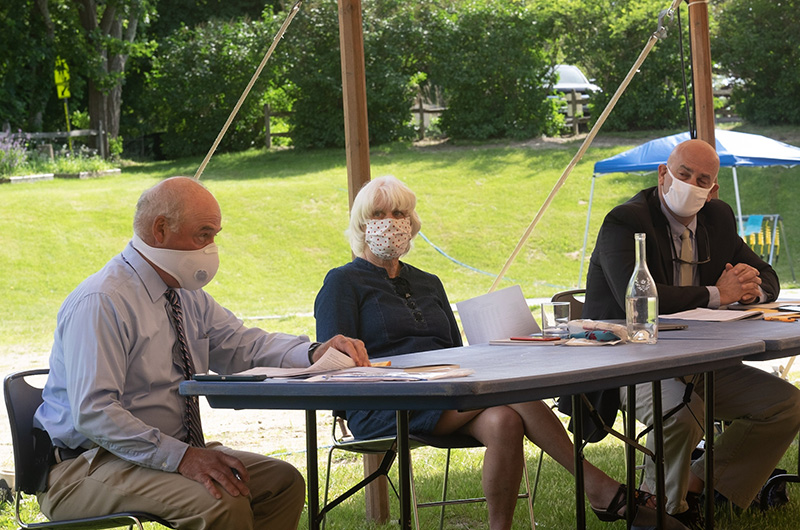Tisbury voters gave a standing ovation to their retiring fire chief, backed a $6.4 million sewer expansion project and agreed to let an initiative that would allow alcohol service without food in town go to the next step at their annual town meeting Saturday.
Postponed from March 31, the meeting was held outdoors Saturday afternoon under a broad tent on the Tisbury School playground. Nearly 200 masked voters turned out, filling all the widely-spaced seats in the shade and overflowing into more chairs scattered across the sunny grass.
“We have gathered under what will be recorded as historical circumstances to do our town’s business in 2020,” town moderator Deborah Medders said after gaveling the meeting to order at 1:23 p.m.
At the outset voters stood and applauded for retiring Tisbury fire chief John Schillig.
Selectman Melinda Loberg fought tears as she acknowledged the longtime chief’s service, which began when he joined the force in 1980. He has been chief since 2002.
“John Schilling is the sort of fire chief for whom buildings are named,” Ms. Loberg said. She also read out proclamations in his honor from the state senate and house of representatives, and embraced the chief before he said a few words to the town.
“It’s been a rewarding experience being your chief,” Mr. Schilling said, thanking his staff and the community. “It’s been an honor to serve.”
In an effort to shorten the proceedings, town officials had agreed to recommend no action on 24 of the 55 articles on the annual and two special town meeting warrants.
“They really wanted this town meeting to move along,” town administrator John (Jay) Grande said.
But voters were not inclined to rush, with public comments and questions accompanying nearly every article during the four-hour meeting.
Several items recommended for no action were instead voted in, including three articles aimed at reducing plastic use.
Although selectmen had planned to delay the student-led Plastic Free MV bottle bylaw with a yearlong process to develop a town action plan on plastics, it all went sideways when voters gave both articles resounding ayes.
Selectman James Rogers argued for the delay to give some leeway to the business community.
But Lillian Robinson, who identified herself as the aunt of two of the Plastic Free MV student activists, had another view.
“This is a small action to take, and frankly the business community has had years, maybe decades to consider this. It’s now up to the citizens to take action,” she said.
Michael Loberg, a member of the town board of health, also took the microphone in support of the youth-led article. “I think we ought to give them the encouragement of our endorsement,” he said, before the rest of his words were drowned out by applause.
The bottle ban passed in the three up-Island towns last year.
A separate nonbinding resolution supporting the voluntary elimination of polystyrene passed unanimously.
Voters also wanted to discuss how the town will spend $276,640 from the ferry embarkation fee fund, questioning a series of proposed expenditures including two $5,225 entries for two years of the police department’s annual membership in the Martha’s Vineyard Law Enforcement Tactical Team.
“I have nothing against the police. I do have a problem with a militarization of the police,” said Dan Seidman, a member of the town planning board.
But police chief Mark Saloio, who was hired 18 months ago and has been reorganizing many internal affairs at the police department, said the membership was mistakenly left off last year’s annual town meeting warrant.
Chief Saloio said the tactical unit has been used at least four times in the past calendar year.

“The overwhelming majority of the things we do as police officers are good but . . . we are an Island,” he said. “If, heaven forbid, we have a life-and-death situation on this Island, it is a minimum three-hour response time. I have to honor you by preparing for the worst-case scenario . . . even though we pray we never have to use it.”
Former selectman Tristan Israel argued that the task force membership was unrelated to the harbor and thus ineligible for embarkation fee funding.
“You can’t tie it back to the harbor in any linear way,” Mr. Israel said. “Can it be amended to be taken out of this and funded through the general fund?”
Town counsel David Doneski, who said the item could be taken out of the article entirely or amended downward.
Finance director Jon Snyder said the tactical team has been funded from embarkation fees for many years because of the potential for threats at the Steamship Authority, which he called “a very difficult place to have any kind of engagement.”
In the end the expenditures passed.
Voters spoke on both sides of a proposal to amend the town liquor law to allow alcohol service without a meal until 11 p.m.
“I don’t happen to drink myself, but I think the time has come, especially in the face of all the restaurants have endured,” said Trip Barnes, supporting the measure.
“I don’t think that what I hope is an exceptional circumstance [should] be taken as an excuse for making a permanent change,” said Katherine Scott, who followed Mr. Barnes at the microphone. “We’re not the rest of the world and I am against making this change at this time.”
In a voice vote, ayes outnumbered nays and the liquor article passed, enabling the selectmen to seek legislative approval for the change.
Marijuana also made an appearance on the warrant, with one article asking if voters would impose a three per cent local tax on cannabis sales and another dedicating that tax revenue to the town’s capital building and infrastructure stabilization fund.
Both passed, minus an amendment proposed by Mac Schilcher to double the local tax to six per cent.
“I think the town could make some money on it,” Mr. Schilcher said.
But Mr. Doneski said three per cent is the maximum allowed under state statute.
Voters unanimously backed a $6.4 million dollar borrowing measure, which also appears on the upcoming town election ballot, to expand sewer service to the State Road business district and capacity at the wastewater plant.
A special ways zoning designation modeled one in West Tisbury for old cart paths and other historic trails won approval, followed by the designation of two special ways that continue into West Tisbury — Red Coat Hill Road and Shubael Weeks Road (also known as Shubael Weeks Path).
And selectmen — in name, though not in function — became a relic of the past as voters renamed Tisbury’s governing body the select board.
The annual town election is June 23, with polls open from noon to 8 p.m. at the emergency services facility on Spring street.











Comments
Comment policy »